Events
Poet vs. Poet
Spoken Word Takes on the Printed Page
Summary of the event that took place on Wednesday, April 18, 2012
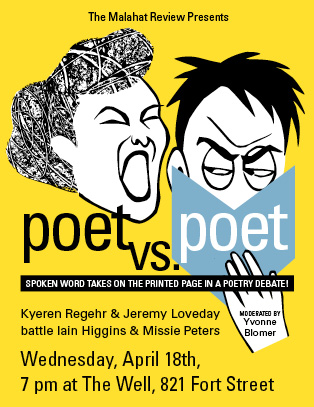
by Benjamin Willems
photos and poster by Ellen Rooney
In celebration of National Poetry Month, The Malahat Review brought together a small crew of recognized spoken word artists and poets to debate whether or not spoken word and written word poetry are distinct genres. The debate's moderator, Yvonne Blomer, said it like this: Are these two art forms really as different as tigers and lemurs? As different as The Malahat Review and YouTube?
The Well kindly hosted the evening in their café, and the audience that gathered ranged from UVic writing students to spoken word enthusiasts to Planet Earth Poetry reading regulars. Many looked like they did not know exactly what to expect. Hopefully they were surprised in a pleasant kind of way.
Each debate team featured one spoken word artist and one on-the-page poet—each with timeslots for debate and a few minutes to perform their own work. Kyeren Regehr and Jeremy Loveday fought for the spoken and the written as two distinct genres while Iain Higgins and Missie Peters called for the two to be united. Each debater had a turn to—as Yvonne would have punned it—Ezra Pound the opposing team in and formulate the more memorable Elizabeth Smartass comments with their true debater-enthusiasm.
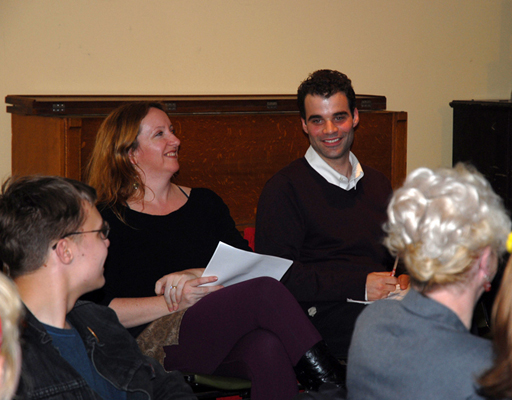
Kyeren began by claiming that yes, the two genres both centre on language, but affect our “noodles” differently. The way one interacts with written language is completely verbal, while spoken word and performance poetry is physicalized—with nonverbal body language. Her foil, Jeremy, went on to add that spoken word poets use the word and a lot and manipulate their audience emotionally. And create political garbage. His final comment: “We win.”
In response, Iain and Missie (in turtlenecks and poet-hats) read the script from a medieval insult “rap battle” that may have been copied verbatim in the courts. Their argument: If anything written down can be performed, or if anything performed can be written down, why differentiate? Many written word poets also perform spoken word—look at Leonard Cohen, Allen Ginsberg, or Sylvia Plath. Even “dead, white males” like Chaucer wrote about audiences hearing their writing. “The different modes of performance,” Iain claimed, “don’t make the things in themselves different. Ballet might look better in tights, but it can still be done in scuba gear.”
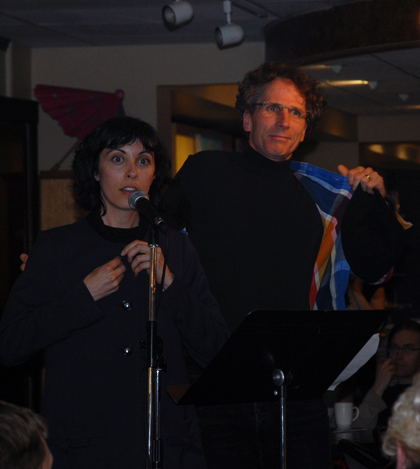
After some more of Yvonne’s puns, she passed the baton back to Kyeren and Jeremy for rebuttals. Jeremy invited sound poet Tom Fowler up to perform something without many vowels. Jeremy’s point: Written language can’t always reproduce what’s spoken. Kyeren followed by providing the audience with handouts—concrete poems by bp Nichol, Mary Ellen Solt, and George Herbert that didn’t sound so interesting when performed aloud. But maybe, Iain countered, exceptions serve to prove the rule. And weren’t genres, when coined by Aristotle, meant to separate comedies from tragedies from parodies rather than separate entire mediums?
If Yvonne hadn’t already mentioned that the event was based on the CBC radio show The Debaters, we would have figured it out during the “firing line” round, where each team fought for the least appropriate answers to poetry-related trivia. According to Iain, for instance, dub poetry is what you say when you stumble over bad poetry—as in, “That was really dub poetry.”
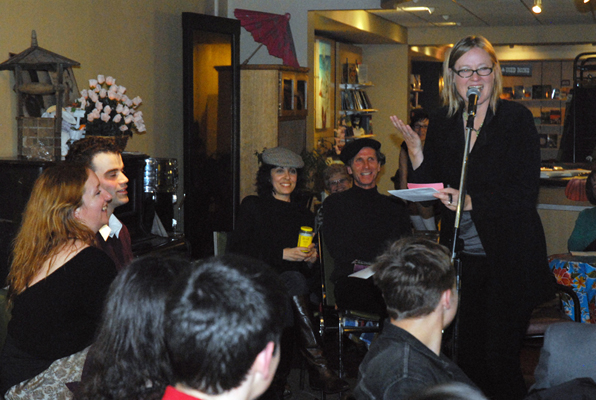
The debaters’ closing statements changed the pace some. Kyeren namedropped philosophers who agree with her and Jeremy—Derrida says two genres, Marshall McLuhan says two genres. Jeremy pointed out the ratio of verbal to nonverbal communication in everyday interactions, inferring that spoken word does so much more than what’s written.
But Iain was not convinced. It was philosophers, after all, back in Plato’s day, who didn’t have the time for poetry. Isn’t that oppression? Missie’s closing statement—or, closing mantra—went hand in hand with this: “Poetic promiscuity, not poetic hierarchy! Poetic promiscuity, not poetic hierarchy!”
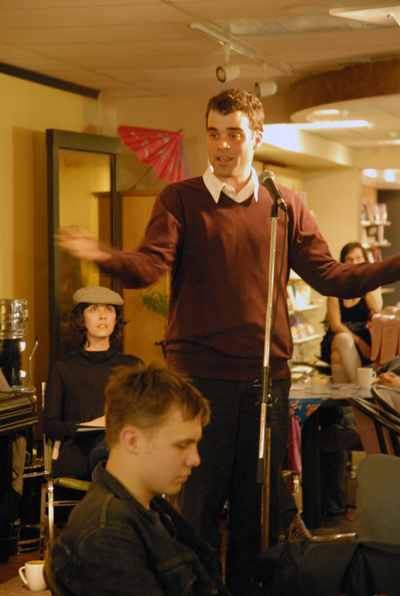
Yvonne had the audience close their eyes to cast a vote for the more successful team. 19 for poetic promiscuity with Iain and Missie, 17 for poetic hierarchy with Kyeren and Jeremy. Some spoiled their votes, so who knows who really would have won, but we don’t think anybody went home with hard feelings.
We'd like to thank the volunteers who helped to put on this event: Heike Lettrari and Portia Carryer for "womaning" the door, Benjamin Willems for taking notes and doing this write-up, and Ellen Rooney for designing the fabulous poster and for taking photos at the event.
See all event photos on facebook.

Media Sponsor









